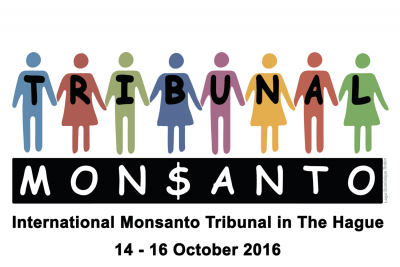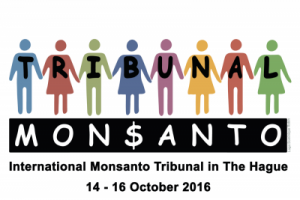Submitted by: Jasmine Pao
Lights flash as Corinne Lepage, the former French Minister of the Environment, takes to the podium to give the opening statement of the Monsanto Tribunal. The Tribunal and People’s Assembly took place between October 14 to 16, 2016 in The Hague, Netherlands, but the verdict may not come out until the end of this year. The international panel of judges listened to experts and witnesses from 5 continents to decide whether Monsanto, a corporation that produces genetically modified organisms, is guilty of charges of crimes against human rights, including personal health and safe environment, food, freedom of research, and even war crimes. The most crucial charge on Monsanto is ecocide (destruction of the environment), a new violation that, if upheld, would change the world by turning a movement into international legislation, setting a precedent of punishment and justice towards corrupt corporations and enforcing the importance of the environment in our world.
Although this trial may not be as widely publicized as other recent court cases, it is just as important. Monsanto creates and patents genetically modified seeds and sells them to farmers for extremely high prices. Monsanto is able to monopolize the seed business and can afford to charge over-the-top prices for their seeds. GMOs aren’t always bad, but Monsanto has a patent on a seed that is engineered to become sterile after it is planted, meaning that the farmers have to buy new seeds every year instead of replanting the old ones. This is detrimental for the farmers who have to pay even more of their hard-earned money to the giant corporation, especially in developing countries where is agriculture only way to survive.
In India, Monsanto has control over 95% of the cotton. The farmers there are forced to buy the Monsanto seeds, which are taxed heavily with royalties and hidden fees. Not only are the crops expensive, but they are also more vulnerable to disease and pests. Before the cotton monopoly, farmers’ cotton seeds were varied and planted with other crops, so when disease would strike, not all of the plants would die. However, Monsanto’s crops are all genetically identical, so a disease would wipe out 95% of all of the cotton in India, plunging the farmers into debt and essentially, destroying their lives. The Indian government’s data shows that 75% of rural debt in India is caused by rising seed costs. Not only are the farmers economically ruined, but they are also emotionally run down as well. According to environmental activist Dr. Vandana Shiva, rising suicide rates are closely connected with the rising debt of farmers. After being forced to use Monsanto’s Bt Cotton seed, the amount of debt and suicides rose sharply. Areas with higher concentrations of the cotton also experienced higher suicide statistics. Monsanto’s cotton monopoly in India that has gravely damaged the citizens’ lives is only one of the reasons Monsanto deserves to be punished.
Around the world, Monsanto’s influence is no less prevalent. In addition to producing seeds, Monsanto markets pesticides. In the Vietnam War, when the U.S. army was at a severe disadvantage due to the confusing, dense vegetation of Vietnam, the government decided to spray the Vietnamese forests with pesticides with over 50 times the concentration of pesticides used on plants in the United States. These pesticides were supplied by huge companies hoping to make a profit without regard for how it would affect Vietnam or its people. Over 4.5 million acres of land were sprayed with about 20 million gallons of the potent pesticides and the effects linger even today. Operation Ranch Hand, or Agent Orange, obliterated lush Vietnamese forests and polluted rural water sources. The pesticides caused over 400,000 civilian deaths. The two million Vietnamese victims and 2.4 million U.S. soldiers that survived suffer severe birth defects, psychological symptoms, and various cancers that are still genetically passed down today. Lawsuits have been brought up against the United States government for violating international laws, but they were rejected as recently as 2008. If Monsanto is finally charged with these grisly murders, justice may finally be served in remembrance of those 5 million victims of the Agent Orange pesticide.
Over 10,000 miles away in France, Monsanto’s trail of pesticidal tragedies continues to haunt victims, especially one family. While Sabine Grataloup was pregnant with her son Theo, she sprayed pesticides over her field. Roundup, the harmful pesticide that affects glyphosate levels in people, has been proven to cause extremely severe side effects when inhaled up to a thousand miles away. When Theo was born, he suffered from extreme congenital defects associated with Roundup, including a malformation of the esophagus, which required surgery to separate his breathing and digestive systems, and a malformed larynx, which necessitated a tracheotomy, or a permanent hole in his throat to breathe out of. In his nine years on this pesticide-ridden earth, he has undergone over 50 surgeries. Ms. Grataloup is testifying on behalf of the dangerous side-effects of Roundup and advocating for a change for the heartbreaking practices of money-obsessed mega-corporations such as Monsanto. It’s time for them to pay for all of the pain they have caused the world.
 Tempus Magazine By Students, For Students
Tempus Magazine By Students, For Students 




